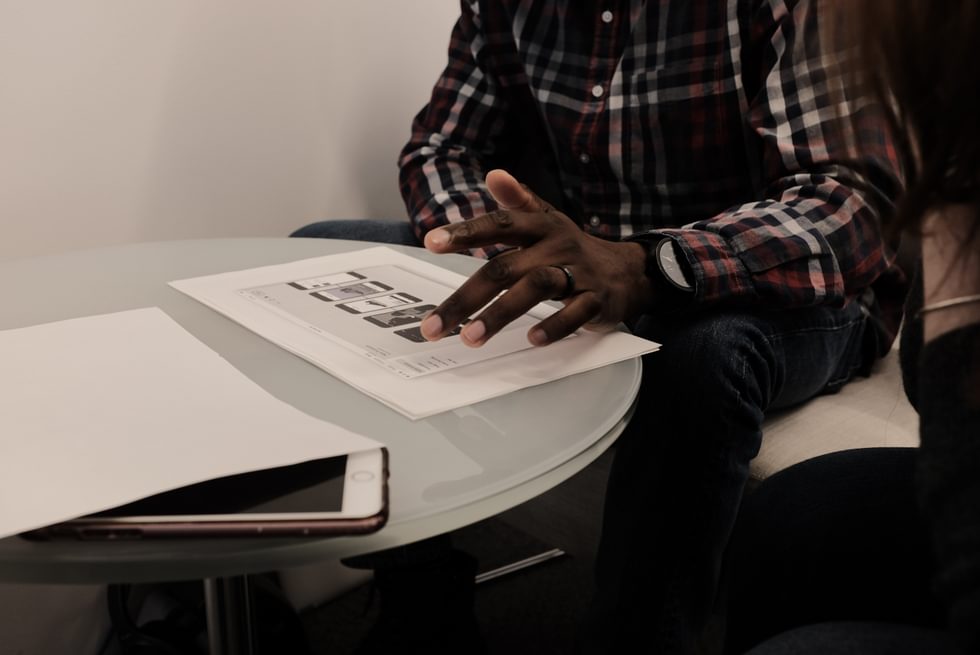Notes from a New, Black UX Researcher
From the Series: Technology and Anthropological Ways of Knowing
From the Series: Technology and Anthropological Ways of Knowing

I stared anxiously at my laptop minutes before my first user experience (UX) interview. COVID-related family obligations had called me home the week before, and I glanced around self-consciously at my oddly preserved childhood bedroom. High school photos, old LEGO® projects, and half-packed boxes offered me embarrassment and nostalgia. Scrutinizing the room behind me displayed on my computer and video calling app, I caught sight of a large poster. Minimalist in design, the poster displayed a large black fist hovering above the bolded world BLACK.
I had never thought much of the poster. I am Black. A poster acknowledging that identity seemed benign and, admittedly, cool to my fourteen-year-old self. While my views of the poster have not changed, the social and political context have shifted considerably: the FBI created a category of Black Identity Extremists; the Black Lives Matter (BLM) movement and its detractors spread vociferously around the world; and national discourses on race relations have fostered new coalitions and strident divisions. I understood the broader social significance of the poster had changed. I worried that my interviewees might harbor negative feelings regarding BLM and consequently participate less enthusiastically in the interview.
Cultural anthropologists have long prided themselves on interviewing prowess. We consider interviewing fundamental in our research toolkit and may even scoff at practitioners of other academic disciplines who infringe upon our research methods. Over time, attentiveness to hierarchies of language, power, space, and more has helped anthropologists rethink what types of data interviewing may produce. Rather than approach interviews as the straightforward extraction of information, most qualitative researchers now approach interviews as intersubjective projects of highly subjective knowledge production. Anthropologists are always profoundly and inexorably implicated in the knowledge they produce. In a trenchant and longstanding example, Franz Boas (1889) demonstrated that poor listening and poor translation marred his colleagues’ conclusions regarding Haida and Kwakiutl language practices. Interviewing and observation are profoundly human practices. Data cannot escape this.
Social scientists still seek to obtain data that is as clean as possible. We wish for informants to feel physically and interpersonally comfortable and to view us as impartial and empathetic observers. It is this desire that first raised my concerns regarding the BLACK poster. Interviewees would certainly not see my younger self hanging the poster with relatively little reflection. I worried interviewees would instead see a declaration of political allegiance and potentially feel less comfortable speaking with me. With three minutes before the scheduled interview start time, I took down the poster. I returned to my computer to see if my camera captured any other potentially polarizing imagery behind me. In a brief fit of anxiety, I also questioned what may or may not even count as polarizing. I stewed in this moment of concern and anxiety repeatedly over the next few days. I took down the poster in the name of professionalism, with the goal of producing the least biased data possible.
I worried I had done something else. Kenji Yoshino (2006) writes lucidly of covering, of daily engagement in myriad practices that obscure and downplay difference. Some may hide their sexuality. Others may hide or minimize a disability. Covering may yield social rewards—popularity, promotions, romantic partners—but often foments shame and embarrassment. My point is not that I feel shame and embarrassment about being black. I am a professional interviewer and have carried out ethnographic projects in Senegal, China, Italy, and the United Kingdom. I do not reduce my choice to take down the poster to a simple act of covering. Covering and professionalism unjustly overlap. Hiring practices across the Silicon Valley attest to severe biases within understandings of professionalism and who can produce good UX data. Cultivating a personal ethic around my professional work will likely continue to foment doubts and questions related to covering.
Some of the work of reflecting and navigating such issues falls squarely on my shoulders. I have long understood, and sometimes challenged, the modes of speech, dress, and language expected of academic contexts. I have learned to rapidly assess the risks and benefits of bringing certain aspects of myself to professional environments. I have found consistent, life-giving support from other Black colleagues. I have also battled bouts of loneliness in primarily white institutions, both academic and corporate. Navigating Blackness in white spaces foments a heightened self-awareness. Inviting others into my personal space for remote UX research has increased this self-awareness. On a basic level, I must constantly assess and adjust my lighting because computer cameras still struggle to see darker skin tones. More broadly, the emotional safety of my unapologetically Black intimate spaces must contend with the standards of professional interviewing. These challenges bring me no joy, but I will certainly adapt.
Opportunities also exist for changes beyond my purview. First and foremost, organizations can hire more diverse UX researchers. That many UX researchers come from MA and PhD programs ensures they bring a level of skill and rigor to their data collection and analyses. At the same time, people with different backgrounds—race, gender, socioeconomic, education, physical ability, language—bring unique perspectives to interviewing, helping to generate the thick, rich, and robust data that qualitative researchers crave. Many major tech companies remain complicit in the elision between researcher and white researcher. Addressing this entrenched status quo may simultaneously challenge biased notions around clean data and generate novel, necessary UX insights.
Boas, Franz. 1889. “On Alternating Sounds.” American Anthropologist 2, no. 1: 47–54.
Yoshino, Kenji. 2006. Covering: The Hidden Assault on our Civil Rights. New York: Random House.